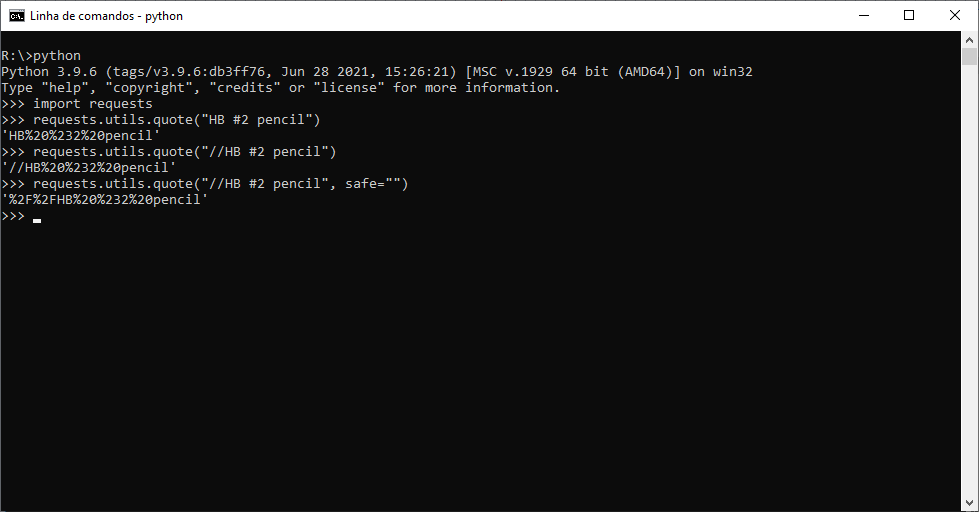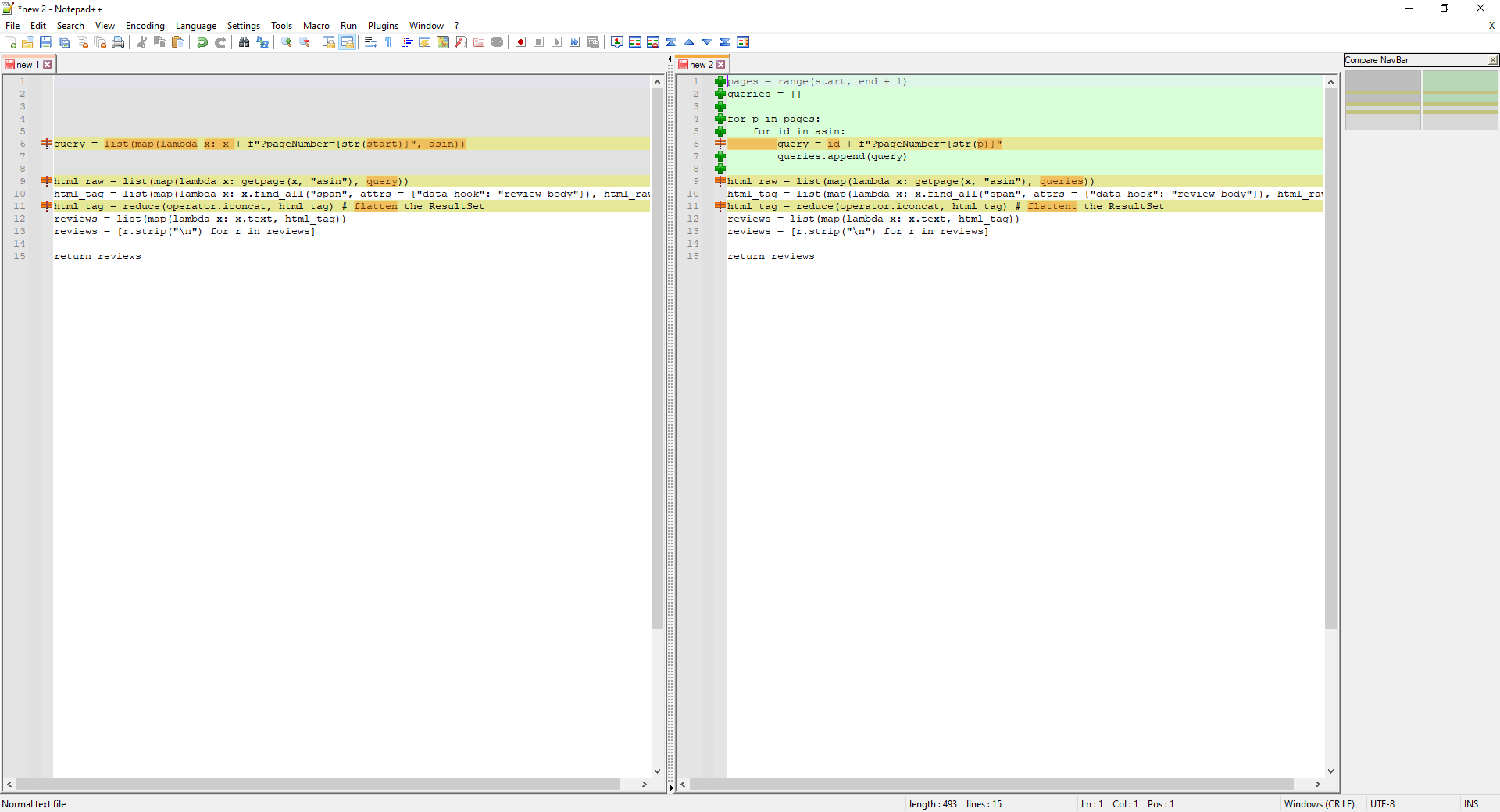I'm new to web scraping and tried building a web scraper for Amazon customer reviews. The program works fine as is but I wanted to improve the design and get some feedback. The basic idea was to scrape customer review contents on Amazon product review pages using specific URL structures.
1. URL to search for product names:
https://www.amazon.com/s?k={product_name}
If I wanted to search for "Iphone 14", then the product query I provide would be "iphone+14" in the URL above.
2. To search for products over multiple pages, the URL would be:
https://www.amazon.com/s?k={product_name}&page={n}
3. Each product has a unique identifier assigned (called ASIN), and each product search page lists ASINs embedded in "div" tag for product names. Customer reviews are on a separate page with ASIN in the URL.
https://www.amazon.com/product-reviews/{ASIN}
Not all the reviews are displayed in one product review page. To search for reviews over multiple pages, the URL used is as follows:
https://www.amazon.com/product-reviews/{ASIN}?pageNumber={n}
Concerns:
- I tried using
map()function to loop over queries on multiple pages. And it led to nested lists which I had to flatten usingreduce(operator.iconcat, ...). Would it be better to just use list comprehension? Or any other suggestions?
For instance, in get_prod_name():
...
pages = range(start, end + 1)
query = list(map(lambda x: query + f"&page={str(x)}", pages))
html_raw = list(map(lambda x: getpage(x, "item"), query))
html_tag = list(map(lambda x: x.find_all("span", class_ = "a-size-medium a-color-base a-text-normal"), html_raw))
html_tag = reduce(operator.iconcat, html_tag) # flatten the ResultSet
products = list(map(lambda x: x.text, html_tag))
...
- Some of the results from
get_reviews()had text "the media could not be loaded." I don't quite understand why this is happening.
I'm very much open to any criticism and thank you guys in advance for helping!
Code:
import requests
import operator
from bs4 import BeautifulSoup
from functools import reduce
# global variables
BASE_URL = "https://www.amazon.com/"
HEADERS = {"User-Agent": "Mozilla/5.0 (Windows NT 10.0; Win64; x64) AppleWebKit/537.36 (KHTML, like Gecko) Chrome/99.0.4844.74 Safari/537.36",
"Accept-Language": "en-US, en;q=0.9"}
# user defined functions
def getpage(query, url_type):
"""
A helper function to create a BeautifulSoup object. Input query string and specify the url type.
The goal is to return html code of a page.
query: str input. Accepts search query by "item name" or "asin"
url_type: specify the url type for the search you're doing. options = "item", "asin"
"""
if url_type == "item":
url = BASE_URL + "s?k=" + query
elif url_type == "asin":
url = BASE_URL + "product-reviews/" + query
else:
return "Error: url type unsupported. Choose from the following 'item', 'asin'"
response = requests.get(url, headers = HEADERS)
if response.status_code == 200:
return BeautifulSoup(response.text, "html.parser")
else:
return "Error: status_code != 200"
def get_prod_name(query, start = 1, end = None):
"""
query: string input. search items on amazon in browser url tab.
e.g. if you wanted to search for "iphone 13", it would be "iphone+13"
start: integer input. starting page number, default = 1
end: integer input. ending page number, default = None
returns a list of product names from search
"""
if end == None:
query = query + f"&page={str(start)}"
html_raw = getpage(query, "item")
products = html_raw.find_all("span", class_ = "a-size-medium a-color-base a-text-normal")
return list(map(lambda x: x.text, products))
else:
pages = range(start, end + 1)
query = list(map(lambda x: query + f"&page={str(x)}", pages))
html_raw = list(map(lambda x: getpage(x, "item"), query))
html_tag = list(map(lambda x: x.find_all("span", class_ = "a-size-medium a-color-base a-text-normal"), html_raw))
html_tag = reduce(operator.iconcat, html_tag) # flatten the ResultSet
products = list(map(lambda x: x.text, html_tag))
return products
def get_asin(query, start = 1, end = None):
"""
***NEED QUERY FORMAT ITEMS TO RETRIEVE ASIN***
query: string input. search items on amazon in browser url tab.
e.g. if you wanted to search for "iphone 13", it would be "iphone+13"
start: integer input. starting page number, default = 1
end: integer input. ending page number, default = None
returns a list of asin associated with the items from search
"""
if end == None:
query = query + f"&page={str(start)}"
html_raw = getpage(query, "item")
html_tag = html_raw.find_all("div", class_ = "s-result-item s-asin sg-col-0-of-12 sg-col-16-of-20 sg-col s-widget-spacing-small sg-col-12-of-16")
return list(map(lambda x: x.attrs["data-asin"], html_tag))
else:
pages = range(start, end + 1)
query = list(map(lambda x: query + f"&page={str(x)}", pages))
html_raw = list(map(lambda x: getpage(x, "item"), query))
html_tag = list(map(lambda x: x.find_all("div", class_ = "s-result-item s-asin sg-col-0-of-12 sg-col-16-of-20 sg-col s-widget-spacing-small sg-col-12-of-16"),
html_raw
)
)
html_tag = reduce(operator.iconcat, html_tag) # flatten the ResultSet
asin_list = list(map(lambda x: x.attrs["data-asin"], html_tag))
return asin_list
def get_reviews(asin: list, start = 1, end = None):
"""
asin: list input. a list of ASIN
start: integer input. starting page number, default = 1
end: integer input. ending page number, default = None
returns individual review contents of a product-review page.
"""
if end == None:
query = list(map(lambda x: x + f"?pageNumber={str(start)}", asin))
html_raw = list(map(lambda x: getpage(x, "asin"), query))
html_tag = list(map(lambda x: x.find_all("span", attrs = {"data-hook": "review-body"}), html_raw))
html_tag = reduce(operator.iconcat, html_tag) # flatten the ResultSet
reviews = list(map(lambda x: x.text, html_tag))
reviews = [r.strip("\n") for r in reviews]
return reviews
else:
pages = range(start, end + 1)
queries = []
for p in pages:
for id in asin:
query = id + f"?pageNumber={str(p)}"
queries.append(query)
html_raw = list(map(lambda x: getpage(x, "asin"), queries))
html_tag = list(map(lambda x: x.find_all("span", attrs = {"data-hook": "review-body"}), html_raw))
html_tag = reduce(operator.iconcat, html_tag) # flattent the ResultSet
reviews = list(map(lambda x: x.text, html_tag))
reviews = [r.strip("\n") for r in reviews]
return reviews
### test
# search_query = "iphone+14"
# print(get_prod_name(search_query, 1, 3))
# IDs = get_asin(search_query, 1, 3)
# print(get_reviews(IDs, 1, 3))


